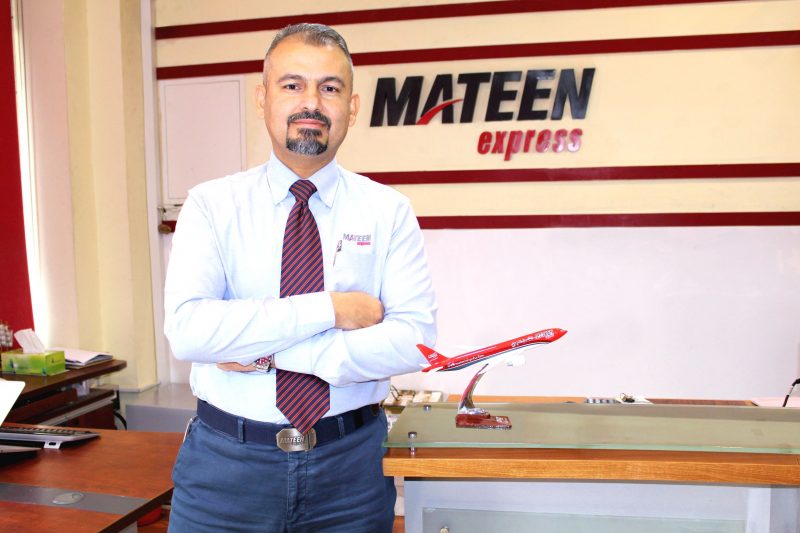MATEEN Express Connecting Iraq to the world
“Conflicts in our region create opportunities for charter operators with ties to the military. But this business model is based on instabilities and chaos and what comes with them is the surge in need of supply – mostly conflict-related – even if humanitarian issues are involved sometimes just used as coating. On the contrary, for commercial scheduled freighter operations to be profitable and sustainable, peace, stability, and positive market conditions are required.”
Over 15 years ago, while the world was holding its breath monitoring the massive US-led military takeover of Iraq, a young engineer was silently crafting a vision and learning how to build a reliable express delivery service to Iraq—a country doomed by wars and conflicts for decades.
Eng. Majid Saidgul Babasheikh Barzanji’s efforts led to the inception of MATEEN Express, a vision-driven company founded on the new generation’s passion to innovate, make a difference and radically improve the lives of Iraqis who have long been suffering from geopolitical conflicts.
“We’re unique in the sense that we started MATEEN Express out of our own needs for systematic reliable logistics and supply chain in Iraq,” shares Barzanji, Chairman and Co-founder of MATEEN Express & Logistics, who is from Kurdistan, the oil-rich region in northern Iraq.
Barzanji holds the distinction as one of the very first to explore possibilities and potentials in the commercial air cargo and express services to Iraq when the country and the Iraqis needed it the most.
MATEEN Express laid the foundation for a completely new era in express delivery, supply chain, logistics integration and airfreight forwarding into Iraq, within Iraq and ex-Iraq. It was the first that offered air cargo and express deliveries for all commercial sectors such as computers, computer parts and mobile phones that were newly-introduced in the war-torn country, among many other life changing commodities.
Barzanji’s team commenced operations of MATEEN Express in 2003. By 2005, it quickly spun-off, simultaneously registering the company in Baghdad, Iraq; Dubai, United Arab Emirates and; in Erbil, the capital of the Kurdistan Region in northern Iraq, under its well-thought brand name MATEEN Express.
It then quickly expanded to China, opening up two main branches in Guangzhou and Yiwu, with multiple private and shared operational hubs across Shanghai, Guangzhou, Shenzhen and Hong Kong. The company kept on developing new concepts, launching new services, improving its offerings, strengthening its workforce with more talents, gaining more grounds and expanding steadily.
By 2014, the group had grown to own 25 branches across the UAE, Iraq, Kurdistan, China and Turkey, employing over 450 staff of 14 nationalities, including Spanish, Germans, Britons and others with origins from the Middle and Far East, among other nations.
Since its establishment in early 2003, MATEEN Express has been operating in its empowering visionary slogan of “Connecting Iraq to the world”—which became literally necessary for every new Iraqi entrant in the field to establish their authenticity.
MATEEN Express proved it’s resilient with no other operators capable of living up to the company’s pledge to its growing customer base in Iraq.
From Soviet era aircraft to modern cargo planes
Despite huge logistical challenges, MATEEN Express began operations in Iraq chartering or co-chartering Soviet-era military freighter aircraft, the Antonov-12, the world’s largest cargo plane (AN-12), and the transport plane Ilyushin II-76, originally designed to deliver heavy machineries to remote areas.
Barzanji says the ease of operating these types of aircraft made their operations seamless apart from imparting to their team invaluable experience in all operational and commercial aspects of flying.
In 2009 the company began commercially operating Western palletized freighters (Boeing-747F, A300F and DC8-63F) into Erbil and Sulaimaniya in the Kurdish Region.
“The DC-8-63F was never operated to Iraq or Kurdistan commercially, let alone on schedule.” Barzanji says, adding, “The core operational difference between the western equipment versus the Soviet ones served MATEEN Express so well in every aspect, especially in dramatically shortening the timings.”
“It enabled us to offer shorter cut-off time in receiving cargo from freight forwarders and direct customers like the DC-8 at the point of origin. The process takes shorter time, from landing until the cargo is cleared and delivered to their final destinations. Most often, the total time saved was almost 6-8 hours, a full working day.”
“The switch to DC-8-63F saved the trading cycle by more than half leading to much more efficient usage of the capital for MATEEN Express’s customers, while saving on fuel consumption and loading more on an aircraft type that was mostly abandoned by almost all operators,” he said noting that the company’s good experience with DC-8 prompted it to start operating the B-747F.
The businessman said the B-747 is no stranger to Iraq with other service providers using it both for military and Iraqi government charter flights.
“But it is totally different when you have to fill in a 100 tons aircraft with individual shipments of over 170 customers (freight forwarders, integrators, direct customers). The sum all these, and our participation in every exhibition in Iraq since 2004, the sizeable investment in our infra-structure and human capital, as well as our prominence on local media, qualified us to lead this industry from the ground up. Whatever we did or say, it took only 6-12 months to be copied by others, where we installed a facility, a copycat opened nearby…,” he added.
Logistics with roots & heritage
Mateen refers to a mountain in Kurdistan (Northwest of Erbil) which in Arabic means “strong, solid, stable, reliable and trustworthy,” among a host of other positive adjectives.
“Mateen is an Arabic word with a very rich meaning,” Barzanji explained on how they came about with the company name from a selection of 28. “We believe a brand name should be selected based on the essence of the company’s vision and mission.”
True to its name, MATEEN Express made history when it landed the first air commercial shipment in Baghdad Airport and the first commercial cargo flight that went into Erbil Airport, even before it could gain its IATA code.
Barzanji worked in Iraq for sometime as an engineer before moving to the UAE to work as a junior design engineer for a major consulting engineering firm based in Abu Dhabi.
Closely monitoring geopolitical changes in the region, especially after the 911 events and the global mobilization of troops to the area, Barzanji connected the dots and made a good sense of what could come next in Iraq, before making a leap to become an entrepreneur.
In 2002 or two years after moving to the UAE, Barzanji left his job and ventured on his own business dealing with info-tech/telecom distribution and retail. He eventually established MATEEN Express in Iraq and the UAE with colleagues.
With first-hand insight of what Iraq needs in terms of transportation and logistics, Barzanji introduced the modern concepts of supply chain management such as cash flow management, stock management, just in-time deliveries, quick market connections, repair-and-return among others in to the country despite the odds.
Within just a short period of time, MATEEN Express has successfully established itself as a reliable and trustworthy logistics company that customers can depend on in good or bad times.
Barzanji said the company achieved that by living up to its core values of honesty and serving customers to the best of their abilities.
“We always do what is best for the customer. We strongly believe that one of the key responsibilities of any logistician is to advise the customer how his shipment could best be delivered (cost, transit time, routing and entry point, potential risks, required documentation, among others). In many cases, we let go a portion of our profit by offering what is best for the customer. We had some tough time how to practice this when we started offering ocean freight service to the public,” he said.
“This trait alone has served us so well. Beyond any marketing efforts, we gained the trust of everyone, customers, associates, service provider and government departments and authorities,” he added.
The engineer turned businessman said they have many experiences where honesty was put to the test. For instance, in November 2007, right before the Dubai Airshow, the company received a call from a major oil firm, “requesting for a miracle” to immediately transport two heavy machineries to Iraq.
“The client (VP of Service & Procurement) told my colleague, ‘We have two MOROOKA towing tractors kept with another operator for seven days already and despite screaming to them repeatedly how desperately we need them on site, they failed to take any action.’ So, we received the vehicles at Dubai Airport before noon of 7th November 2007.
“It was a difficult situation due to the Dubai Airshow 2007, DCAA temporarily ddidn’t give permission for IL-76’s to fly. We had to act very quickly to save the client. So, we met the customs manager at DAFZA to approve retrieving the vehicles out of Dubai customs bonded warehouse (Dubai airport FLC), and re-arranged our flight plan to load them from Sharjah. We did it…Following a well-engineered collaborative effort of our flight, ground, customs, safety and transport teams, we delivered the units right before the sunset of 9th Nov 2007, just like a miracle.”
Barzanji said what impressed the client more than the company’s flexibility to deliver on its promise is its honesty.
“They agreed to a full charter price due to their critical situation, but we managed to load about 8 tons of commercial cargo on the same flight and shared a copy of the original manifest with them. We shared the revenue of this excess cargo as discount on their bill. They couldn’t believe how far we would go in putting our values in practice,” he recalled.
Helping rebuild Iraq
Since 2003 Iraq has been facing a different kind of war, reconstruction and rebuilding. Its violent past destroyed much of its basic infra-structure, cities and villages wiped out, millions displaced & rendered jobless.
Officials estimate Iraq would need at least US$88.2 billion to restore. Of this, about $17 billion would just go to rebuilding homes.
The World Bank says Iraq’s growth outlook is set to improve in 2019 with oil production expected to increase due to favorable security environment and a gradual pickup of investment for reconstruction.
In post-war era, MATEEN Express’s primary role of transporting and delivering what Iraq and its people needs remains vital.
It ships on a regular basis high-tech disinfectant from Mexico to key cities in Iraq to protect people from bacterial and germicidal infections, especially when there are large gatherings for religious purposes.
It is also actively helping Iraqis striving to rebuild their livelihood by hauling products they ordered overseas such as equipment, building materials, machineries, cosmetics, vehicles, among many others.
The company also encourages clients to communicate their concerns and needs to help broaden their options. “We cater to a broad and wide range of services,” says Barzanji who noted that part of their success in serving customers is being based in Dubai which is safe and business friendly. “You don’t feel like a stranger in Dubai. We’re based in the UAE and that helps.”
With offices in Dubai, Turkey and China, MATEEN Express is strategically positioned to effectively meet the current and future logistics and supply needs of their clients.
“It’s a fact that whatever happens in the political landscape has an impact on business. Logistics and freight forwarding, their nature of business is responsive. Somebody is buying something, regardless of the mode of transportation and time sensitivity. In general, for any business to grow, commercial activities must grow,” concludes Barzanji who was elected in 2015 as board member in the Executive Committee of the National Association of Freight and Logistics, a nonprofit group representing the freight and logistics industry in the UAE. The body entrusted him to chair the Air Freight Subcommittee.
Deeply rooted in Iraq with personal insight on the ground, Barzanji shares his thoughts on what to expect on the future of the air cargo industry in the country, once the envy of many with its vast oil resources and wealth.
Well, on global and regional levels, the air cargo industry faces many challenges. The soft global economy, the new trade wars, flight disruptions due to political situations and conflicts would be just a few.
Many major freight operators reported continuous prolonged losses, some quit already, or have downsized dramatically, yet the ball is still rolling.
Conflicts in our region create opportunities for charter operators with ties to the military. But this business model is based on instabilities and chaos and what comes with them is the surge in need of supply – mostly conflict-related – even if humanitarian issues are involved sometimes just used as coating.
On the contrary, for commercial scheduled freighter operations to be profitable and sustainable, peace, stability, and positive market conditions are required.
For a long time, I practically have proven the concept that I believed in –”If a freighter operator flies on schedule; everyone will fine-tune his or her supply with it.”
Yet over the last couple of years, the global market landscape had imposed tough times on every freight operator to become creative in introducing new routes. In fact, maintaining current operations is already a tough challenge for almost everyone.
You hear merger talks here and there; You see collaborations among operators thought to be sort of competitors. Airlines that used to say we fly solo now cooperate on different levels, and so on.
Bear in mind, sustainable commercial air cargo, is the product of close cooperation and collaboration of so many stakeholders, governmental, private and semi.
Any successful efforts – e-air waybill – for example, involves airlines, freight forwarders, shippers, ground handlers, police & airport security, airport authorities, customs department, technology providers – Calogi for example – as well as industry bodies like IATA, FIATA, the latter represented by NAFL in the UAE.
This leads me to the question where we started. What is next for the air cargo industry in Iraq?
Let’s agree on some facts. This oil-rich country is pretty much devastated in every aspect. With over 15 years of continuous destruction going on, entire cities are flattened to the ground, no real infrastructure roads, bridges, power stations, dams, hospitals, universities, hotels, entertainment facilities, you name it. Any time real rebuilding efforts show on the horizon, there will be massive requirements for logistics and supply chain services, air cargo included.
But let’s be realistic. The Iraqi government, if there is one soon and I don’t expect it to march to real different drummer, will have pretty much the same problems as its predecessors. The past governments were not very successful in truly developing much when it comes to the air cargo industry.
Any government (past, present and future ones) needs a strong drive to put all these stakeholders to collaborate and to improve the air cargo industry. And what would be the source of this drive?
None of the previous governments showed much interest in developing Iraq’s air cargo industry. Is this going to change? I don’t think so. The very nature of air cargo fades out compared to the fanciness of passenger aircraft and private executive jets, good looking air hostesses and super prestigious airport terminals unless there is a real drive sourced from deep understanding of the significance of air cargo and its impact on people’s lives, contribution in enhancing the supply chain performance and hastening the economic cycle as well as the success or failure of any real business and industries such as pharmaceuticals, telecoms, fresh and frozen food, to name a few.
As for Kurdistan, first it does not have control over its own sky or the airports. Second, the September 30, 2018 election is yet to have its results cleared, and a new KRG could take a few months to get into action.
Even when it is operative, I don’t think we will witness major improvements in the foreseeable future. We will have to wait for the actual rebuilding of Iraq to start, until then, I think standing tall and ready to engage is a challenge for many.





